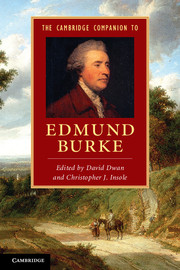Book contents
- Frontmatter
- Contents
- Contributors
- Acknowledgements
- Method of Citation
- Chronology
- Introduction Philosophy in Action
- 1 Burke’s Life
- 2 Burke, Enlightenment and Romanticism
- 3 Burke as Rhetorician and Orator
- 4 Burke’s Aesthetic Psychology
- 5 Burke on Law and Legal Theory
- 6 Burke on Political Economy
- 7 Burke and Religion
- 8 Burke and the Constitution
- 9 Burke and the Natural Law
- 10 Burke and Utility
- 11 Burke and the Ends of Empire
- 12 Burke and the American Crisis
- 13 Burke on India
- 14 Burke and Ireland
- 15 Reflections on the Revolution in France
- 16 Burke’s Counter-Revolutionary Writings
- 17 Burke in the United States
- Further Reading
- Index
- References
5 - Burke on Law and Legal Theory
Published online by Cambridge University Press: 05 December 2012
- Frontmatter
- Contents
- Contributors
- Acknowledgements
- Method of Citation
- Chronology
- Introduction Philosophy in Action
- 1 Burke’s Life
- 2 Burke, Enlightenment and Romanticism
- 3 Burke as Rhetorician and Orator
- 4 Burke’s Aesthetic Psychology
- 5 Burke on Law and Legal Theory
- 6 Burke on Political Economy
- 7 Burke and Religion
- 8 Burke and the Constitution
- 9 Burke and the Natural Law
- 10 Burke and Utility
- 11 Burke and the Ends of Empire
- 12 Burke and the American Crisis
- 13 Burke on India
- 14 Burke and Ireland
- 15 Reflections on the Revolution in France
- 16 Burke’s Counter-Revolutionary Writings
- 17 Burke in the United States
- Further Reading
- Index
- References
Summary
Burke’s training in, knowledge of, and appreciation for law is generally recognised. Indeed, Anglo-American jurists have been quick to claim him as their own and to employ him as an authority in present debates. But his extensive use of legal language obscures how little he actually said or wrote about legal theory. Burke’s comments on the law were typically made in specific and complex, rapidly changing, political controversies. His reflections are often little more than the obiter dicta of political and public debates and should not be confused with more formal commentaries on the laws. Pregnant with meaning for the present, Burke’s thoughts must, here as elsewhere, be viewed in context. When this is done, his texts suggest a picture that is often at odds with common assumptions about him and his relationship to the law. The Irishman’s opinion of English jurisprudence is, for example, complex and not wholly complimentary. Especially in his early pre-political writings, Burke’s jurisprudential asides presented a challenge to ‘vulgar Whiggism’ and insular English and common law histories. His parliamentary statements also suggest that he emphasised the centrality of the legislature rather than, as is often suggested, the courts of common law. Perhaps most importantly, Burke’s use of legal terms – contract, partnership, prescription, rights – is often rhetorical, defined against his wider understanding of the relationship of morals, manners, and history.
- Type
- Chapter
- Information
- The Cambridge Companion to Edmund Burke , pp. 67 - 79Publisher: Cambridge University PressPrint publication year: 2012
References
- 2
- Cited by

